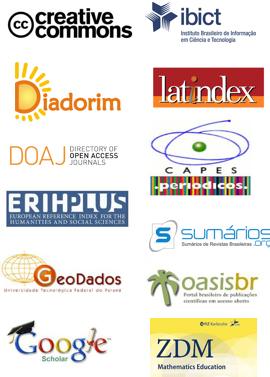Habilidades Matemáticas na Base Nacional Comum Curricular: Vislumbrando Caminhos Analíticos
DOI:
https://doi.org/10.17921/2176-5634.2021v14n1p32-41Resumo
Resumo
No artigo em tela, objetivou-se a análise da Base Nacional Comum Curricular (BNCC), na área Matemática, que emergiu no Brasil e foi consolidada após um processo de consultas públicas e debates. Os aportes teóricos adotados para a análise foram Bishop (1999), que propôs competências matemáticas básicas para a formação do cidadão, Doll (1997), que sugeriu alguns critérios para a organização do currículo, e Silva (2009), que o ampliou em outros critérios, dividindo-os em dois grandes blocos, sendo o primeiro relacionado à seleção dos conteúdos, e o segundo relacionado à organização curricular. Os referenciais foram adotados para a análise da coerência da prescrição para os Anos Finais do Ensino Fundamental, relacionando seus indícios e suas conexões com o quadro preliminar do Projeto Matemática 2030, que visa, dentre outras coisas, estabelecer critérios para a análise dos programas destinados às futuras gerações de alunos. Os critérios e suas conexões auxiliam na compreensão de tendências e impactos de reformas nos documentos prescritos para Matemática no Brasil e em outros países. Os resultados suscitaram uma visão multicultural restrita às unidades Álgebra e Probabilidade e Estatística ao relacionarem os objetos de conhecimento à percepção do sentido dos conteúdos para uso social e acesso à cidadania.
Palavras-chave: Base Nacional Comum Curricular. Habilidades. Critérios de Análise. Anos Finais do Ensino Fundamental. Matemática.
Abstract
The objective of this paper is to analyze the National Curricular Common Base (NCCB), Mathematical area, which emerges in Brazil and was consolidated after a process of public consultations and debates. The theoretical contributions adopted for the analysis were Bishop, who proposes basic mathematical skills for the formation of the citizen, Doll, that suggests criteria for the organization of the curriculum, and Silva, that expands in others, dividing them into two large blocks, being the first related to the selection of contents and the other to the curricular organization. The references were adopted for the analysis of the consistency of the prescription for the Final Years of Elementary Teaching, relating their indications and their connections with the preliminary framework of the Mathematics 2030 Project, which aims, among other things, to establish criteria for the analysis of the programs destined to future generations of students. The criteria and their connections help in understanding the trends and impacts of reforms in the documents prescribed for Mathematics in Brazil and in other countries. The results gave rise to a multicultural view restricted to the units Algebra and Probability and Statistics, relating the objects of knowledge to the perception of the meaning of the contents for social use and access to citizenship.
Keywords: National Curricular Common Core. Skills. Criteria of Analysis. Final Years of Elementary School. Mathematics.


